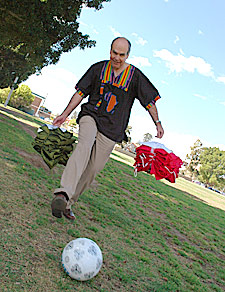Weighed down with uniforms donated by Soccer NSW, Rick Ford, a Program Officer with the Archbishop of Sydney’s Overseas Relief and Aid Fund (ORAF) is heading to Tanzania to save lives.
Amazingly, soccer is being used to stop malaria outbreaks that are the leading cause of death in children under five years old and responsible for one third of deaths in Tanzania.
 The small African nation spends a staggering US$119 million on treating malaria-related diseases.
The small African nation spends a staggering US$119 million on treating malaria-related diseases.
The loss of productivity due to illness combined with the burdensome cost of medical treatment means malaria has become a major break on this developing nation.
Three soccer teams from different villages are a part of a unique malaria education program that is making a difference.
The initiative is helping to reduce the instances of the disease by educating people about the simple use of mosquito nets infused with insecticide.
“Our Katoke Reduction of Malaria Program (ROMP) brings communities in different villages together through events such as soccer matches," says Mr Ford.
"While they're together we tell them how important it is to protect themselves at night by sleeping under a mosquito net."
The 2002 pilot project, designed by Professor Alan Watson and Dr John Stephenson from Gymea Anglican, surveyed the vast majority of people living in the village of Buhaya.
The research revealed 62 per cent of villagers experienced one or more episodes of malaria.
248 villagers required hospitalisation to treat malaria-related conditions, but only six villagers reported sleeping with a mosquito net.
But after one year of the ORAF program 61 per cent of the people sampled had started using an insecticide-treated net.
Malaria cases dropped by 43 per cent in that year alone.
“Many of the soccer players are healthy today because they follow this simple procedure at night," Mr Ford says.
"And a soccer game is a great opportunity to show others in this region that malaria need not be just another disease that is a part of their lives.”
AusAID and ORAF are now funding an expanded three-year program that will aim to take the message to more than 10,000 people.
Mosquito net use has already shot up by 70 per cent in the new areas where the program is running.
For more information or to support Katoke ROMP contact ORAF on (02) 9895 8080.























